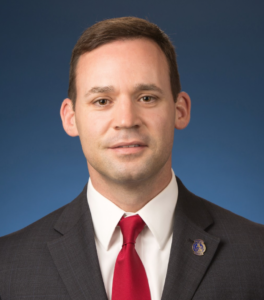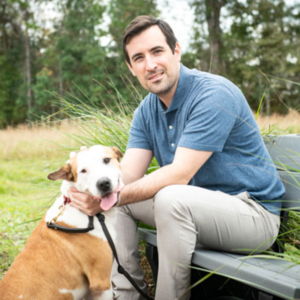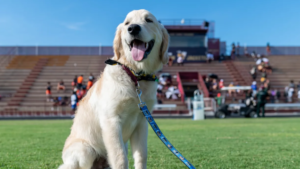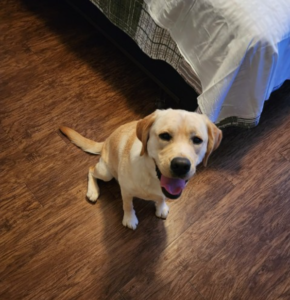Is the world’s largest military service dog charity raising money on a heartwarming misrepresentation?
It’s a straight-to-the-heart motto that has helped non-profit K9’s For Warriors raise more than $130 million from donors:
“We rescue the dog and the dog rescues the veteran.”
The Ponte Vedra-based charity promises donors that their money will be used to rescue dogs from high-kill shelters and transform them into highly trained service animals to provide new life for former soldiers suffering from PTSD, traumatic brain injuries, and military sexual trauma.
But the training process has proven difficult and led to heartbreaking failures for veterans, according to eleven past and present K9s For Warriors trainers who spoke with the Florida Trident on condition of anonymity. They say that because of a low success rate the charity has primarily been purchasing pure-bred dogs – a practice that has especially ramped up during the past year.
The pitch regarding shelter dogs, however, hasn’t changed, as the website unambiguously boasts: “Your gift will help save a warrior and a rescue dog!”
“It is, at best, deceptive,” said one long-time K9s For Warriors trainer, who asked to remain anonymous due to fear of reprisal. “The increase in purchasing dogs is their attempt to quietly remedy the fact that such a low number of shelter dogs successfully make it through the program.”
The revelation came after the Trident published the first installment of an ongoing investigation of the charity, which found K9s For Warriors has been plagued by financial and administrative mismanagement that led to the release of an overwhelming number of poorly-trained psychiatric service dogs to veterans.

The Trident‘s investigation was prompted by the resignation of Rory Diamond, the Jacksonville city councilman who helmed K9s For Warriors from 2017 until October of last year. Diamond said he gave up the $300,000-a-year job to focus on reelection and a stint in the Army Reserves. Sources at the non-profit say K9s For Warriors was in near shambles when he left it. Diamond has refused comment, but issued a written statement after the first article was published to claim it was “littered with falsehoods and innuendos” while not specifying any factual errors.
Shortly after the initial piece was published, the charity laid off twenty-one employees, which amounted to roughly ten percent of its workforce, according to sources. Current CEO Carl Cricco didn’t respond to questions from the Trident, but told KSAT-TV in San Antonio, where the charity has a satellite facility, that the layoffs were needed to help make K9s For Warriors “more fiscally sound.”
It was another discouraging development for the charity, billed as the largest provider of service dogs to veterans in the world, which insiders say has devolved into a dysfunctional – and deceptive – organization.
Wagging the dogs
All eleven trainers who worked for K9s For Warriors said the charity’s premise that a large number of shelter dogs can be trained as service dogs has always been shaky.
“The sad fact is dogs are typically in shelters for reasons,” said one former K9s For Warriors’ trainer, referencing emotional and behavioral issues. “Most of those reasons will keep them from becoming service dogs.”
Management at the charity was well-aware that very few shelter dogs could be trained as service dogs, said Elena, a trainer who asked to be given a pseudonym to protect her identity.
“Most shelter dogs are used for show,” Elena said. “They’re brought to K9s, taught some simple commands, then put up for adoption for publicity purposes. This way K9s can still say they rescue shelter dogs.”
Some shelter dogs that don’t make the grade can languish at K9s For Warriors’ kennels for long periods, she said, while some, “just kind of disappear.”
Internal K9s For Warriors documents obtained by the Trident show that a “dog purchase meeting” was held on March 7 of last year to discuss ramping up the buying of pure-breed dogs.
“We were getting less and less time with the dogs,” said Elena. “The trainers who voiced their opinions that we needed more training time were fired. Finally, [then-CEO Rory Diamond] called an emergency all-staff meeting in July 2022.”
Elena said that during the meeting, corroborated by five others in attendance, Diamond announced there were hundreds of veterans on the waiting list and the charity needed to find a faster way to get service dogs out the door.
“He then told us K9s would be purchasing more dogs that were already trained, so the trainers wouldn’t have to really work with the dogs at all,” she said.
Diamond reminded employees the information given at the meeting was “proprietary” and wasn’t to be shared with the public, said Elena and other trainers present at the meeting. They also claimed the city councilman said the charity was looking for a way to “spin” the use of purchased dogs to the public so it would be “beneficial to donors and directors.”
They said Diamond told staff that as long as 51 percent of the dogs came from shelters the non-profit would technically be telling the truth about shelter dogs, but trainers said that wasn’t the case.
“For the last two years there has definitely not been anywhere close to 51 percent of shelter dogs being paired with vets.” Elena said.
K9s For Warriors needs a large number of dogs and dollars to maintain their status as the world’s largest facility. But trainers said the charity’s selection process was lacking as they focused on buying dogs in bulk from numerous vendors rather than on quality control. Some of the dogs had “washed out” of other training programs. As a result, many of the purchased dogs came with problems as well.
Some breeds, the trainers said, are easily distracted, aggressive, over-reactive and have deep-seated fears, traits that should have disqualified them from being purchased to train as service dogs. Other breeds develop health problems from over-breeding, including joint, heart, and breathing problems.

Numerous K9s for Warriors sources said that while industry standards dictate a minimum of nine months for training, they were directed to train dogs in just 12-weeks. They said they were sometimes ordered to train animals that were under a year old when accepted standards say the dogs should be at least 18 months.
While training is ideally done in quiet and non-distracting environments, the trainers said K9 training kennels are noisy and chaotic, which stymies progress and can traumatize pure-breds and re-traumatize shelter dogs.
On May 11, current K9s For Warriors CEO Cricco told Jacksonville television station New4Jax that the charity presently pairs 16 service dogs with veterans each month.
“Cricco’s claim is absolutely not realistic,” said one trainer. “K9s For Warriors is now attempting to ‘mass train’ dogs of all ages, all in three months. This is impossible.”
When a dog cannot be trained as a service dog and must be put up for adoption, K9s for Warriors has a name for it: “career-changed.”
“When we told our training managers that a dog should be career-changed, many times they came back to us and told us the Board of Directors ordered us to award the dog [to a veteran] anyway,” said Elena. “We never knew if that was true.”
With the layoffs and other internal problems, the charity has been in search of new revenue and positive publicity, she said. And it was in that pursuit that K9s decided to adopt a similar concept used by other organizations to raise money. K9s For Warriors would call the practice “Team Dogs.” They would solicit five-figure donations from professional sports teams in return for training a service dog that would make public appearances at the teams’ games.
The sports teams would eventually donate the dog to a disabled veteran, which would entail a large media event that would promote both the teams and K9s For Warriors.
The charity struck its first such deal with the NFL team Jacksonville Jaguars. A dog was chosen – and now insiders at the charity say they’ve been concerned the whole thing could become an all-too-familiar disaster.
Retrieving Mojo
A K9s For Warriors administrative employee told the Trident that the Jaguars agreed to join the promotion with conditions. The dog must be a pure-bred puppy that didn’t come from a shelter, would be trained by K9s For Warriors at their facility and during Jaguars’ games, and had to be available at all times to appear at Jaguar functions.
A breeder donated a golden retriever puppy in January 2022 that in May was named “Mojo,” in honor of former star running back Maurice Jones-Drew. Mojo made his first public appearance in June 2022 and appeared at several Jaguars games.
But there were problems from the start. Mojo was placed in the care of a K9s For Warrior administrative employee and was kept for long periods of time in a kennel crate at the employee’s home, said trainer Elena. This prompted the dog to develop a deep-seated fear of crates, which are necessary for the safety and housing of a service dog. She said Mojo had no scheduled training time and was dropped off only intermittently for training at K9s.
Additionally, the disjointed training process and large crowds at Jaguars’ events, seemed to “stress” the “sweet-tempered and intelligent” golden retriever, said Elena.
As anxiety issues and behavior problems became manifest in Mojo, he was moved in December to the care of an outside trainer, where he remained until he was paired with a veteran the first week in July. When Elena last saw Mojo, he appeared to be more confident. However, she said, he had not overcome his fear of crates. Mojo is scheduled to officially “graduate” with a veteran in a large ceremony with K9s For Warriors and members of the Jaguars on July 27.

“Mojo is a special dog, one that we are certain will thrive upon being paired with a veteran as part of the programming for K9s For Warriors,” Jaguars vice president John Dever wrote in a statement to the Trident. “We’re confident in Mojo and excited for his future as he positively impacts another veteran in our community.”
While trainers say their hopes are also high that Mojo, with the specialized instruction from the independent trainer, will prove to be a successful service dog, K9s For Warriors and the football team can only hope some of the nightmare scenarios that have played out in the past don’t repeat themselves.
As previously reported by the Trident, internal documents obtained from a K9s For Warriors source showed that 144 faulty service dogs had been returned from 2011 through 2019 alone. One disastrous class of ten dogs paired with veterans in October 2021 ended with eight returned due to aggressiveness and other forms of poor behavior.
But those stories were all told anonymously, until former Army Sgt. Jamie Miller, who served two tours in Iraq, was moved to come forward after reading the initial report by the Trident.
“Forgotten how it felt to have hope”
Miller said she knows about K9s for Warriors’ failures first-hand. Her experience is not unique, but her willingness to openly share that experience despite the legal threats the charity’s standard non-disclosure agreements present is extremely rare.
In 2013, after Miller suffered profound trauma in Iraq, she was placed on disability with acute PTSD and other severe physical and psychological diagnoses.
When she decided to apply for a service dog from K9s For Warriors, it took over two years on the waiting list before she was scheduled for a “warrior class” at K9s satellite facility in San Antonio in November of 2022.
“I had forgotten how it felt to have hope,” she said, “until that call came.”

Jamie arrived in San Antonio in the early evening and the next morning she was introduced to “Bailey,” a hound-like Catahoula Leopard Dog, known as a very active breed that requires a large home and lots of exercise and mental stimulation. Without vigorous activities Catahoulas sometimes act out and become destructive.
Bailey lived up to his pedigree.
“I was handed Bailey’s leash and he immediately dug a hole and repeatedly pounced up and down in it,” Miller recalled. “He began to pull at the leash and zigzag back and forth around the open spaces and dragged me along for the ride.”
Exhausted, she finally took him to her room.
“He jumped on the bed and slung the pillows from side to side,” said Miller. “He began running from one end of the room to the other, and slammed into the pocket door. Then he jumped on the bed again and this time began to rip the sheets off the bed. I videoed Bailey’s enthusiasm because I knew no one would ever believe it.”
Then she notified K9s For Warriors that she and Bailey were not meant to be.
Miller said the Director of Warrior Operations at K9s later chastised her on the phone for making a hasty decision about Bailey before offering her a second chance to receive a service dog.
The charity then flew Miller to its main campus in Ponte Vedra in February 2023 for another class, where she was presented with “Webster,” a 14 month-old English Labrador Retriever.
“It was love at first sight,” said the former soldier.
Inside their posh dormitory, Webster was a sweet docile snuggler. But in the training and play area he turned into a resolute lunger who barked incessantly at the other dogs in class. Restraining Webster aggravated her injuries. “My shoulders ached all the time,” she recalled. “but I didn’t mind. I kept thinking of the end result. ”
A trainer attached a special vest and leash on Webster and taught Miller to yank sharply on the leash to deter the lunging and barking. It didn’t work. She said she noticed others in her class also seemed to have some difficulties with their dogs, but she rarely interacted with her classmates because she was afraid Webster’s behavior would bother the other women and their dogs.
Despite Webster’s issues, Miller and her dog were closely bonded. And despite the obvious problems, the pair graduated in late February.

“I knew he had a lot of ‘puppy’ in him,” she said, “but I believed he could be trained to be my service dog eventually.”
K9s For Warriors acknowledged Webster had issues and told Miller to find a dog trainer in her area. The charity offered to pay for extra training at her home, starting with ten sessions. Paying for outside training for substandard service dogs is standard practice at the non-profit, said multiple insiders.
She found a certified trainer with a list of impressive credentials and years of experience, but she and Webster had to wait until May for a training date. Meanwhile Webster’s problematic behavior continued to escalate.
After the second private training session, the trainer gave Miller the bad news: Webster simply did not have the temperament or aptitude to become a psychiatric service dog.
The trainer and an emotionally crushed Miller informed K9s For Warriors. The charity said they could either take Webster or she could keep him as a pet. Miller was devastated at the choice.
“I love Webster,” she said in the present tense. “But I read and heard about people with PTSD like mine whose life had been changed with a real service dog. And I had no room for two dogs in my little house.”
A “procurement specialist” came and picked up Webster in mid-May. Miller said it was like a death in the family and that she still mourns not only for her loss but for others going through similar pain at the hands of K9s For Warriors.
“Having to give my dog back was heartbreaking for me,” said the veteran. “But more upsetting is to see yet another organization that uses us and our misery just to make money for themselves.”
About the author: Susan Clark Armstrong is a veteran investigative reporter and former Florida Times-Union columnist who lives in the Jacksonville area.
